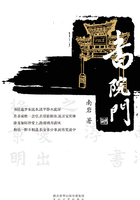GOUVERNEUR MORRIS. PARIS. AUGUST 10, 1792.
Justum et tenacem propositi virum Non civium ardor prava jubentium, Non vultus instantis tyranni Mente quatit solida, neque Auster Dux inquieti turbidus Hadriae, Nec fulminantis magna manus Jovis:
Si fractus illabatur orbis, Impavidum ferient ruinae.
--Hor., Lib. III. Carm. III.
GOUVERNEUR MORRIS
The 10th of August, 1792, was one of the most memorable days of the French Revolution. It was the day on which the French monarchy received its death-blow, and was accompanied by fighting and bloodshed which filled Paris with terror. In the morning before daybreak the tocsin had sounded, and not long after the mob of Paris, headed by the Marseillais, "Six hundred men not afraid to die," who had been summoned there by Barbaroux, were marching upon the Tuileries. The king, or rather the queen, had at last determined to make a stand and to defend the throne. The Swiss Guards were there at the palace, well posted to protect the inner court; and there, too, were the National Guards, who were expected to uphold the government and guard the king. The tide of people poured on through the streets, gathering strength as they went the Marseillais, the armed bands, the Sections, and a vast floating mob. The crowd drew nearer and nearer, but the squadrons of the National Guards, who were to check the advance, did not stir. It is not apparent, indeed, that they made any resistance, and the king and his family at eight o'clock lost heart and deserted the Tuileries, to take refuge with the National Convention. The multitude then passed into the court of the Carrousel, unchecked by the National Guards, and were face to face with the Swiss. Deserted by their king, the Swiss knew not how to act, but still stood their ground. There was some parleying, and at last the Marseillais fired a cannon. Then the Swiss fired. They were disciplined troops, and their fire was effective. There was a heavy slaughter and the mob recoiled, leaving their cannon, which the Swiss seized. The Revolutionists, however, returned to the charge, and the fight raged on both sides, the Swiss holding their ground firmly.
Suddenly, from the legislative hall, came an order from the king to the Swiss to cease firing. It was their death warrant.
Paralyzed by the order, they knew not what to do. The mob poured in, and most of the gallant Swiss were slaughtered where they stood. Others escaped from the Tuileries only to meet their death in the street. The palace was sacked and the raging mob was in possession of the city. No man's life was safe, least of all those who were known to be friends of the king, who were nobles, or who had any connection with the court. Some of these people whose lives were thus in peril at the hands of the bloodstained and furious mob had been the allies of the United States, and had fought under Washington in the war for American independence. In their anguish and distress their thoughts recurred to the country which they had served in its hour of trial, three thousand miles away. They sought the legation of the United States and turned to the American minister for protection.
Such an exercise of humanity at that moment was not a duty that any man craved. In those terrible days in Paris, the representatives of foreign governments were hardly safer than any one else. Many of the ambassadors and ministers had already left the country, and others were even then abandoning their posts, which it seemed impossible to hold at such a time. But the American minister stood his ground. Gouverneur Morris was not a man to shrink from what he knew to be his duty. He had been a leading patriot in our revolution; he had served in the Continental Congress, and with Robert Morris in the difficult work of the Treasury, when all our resources seemed to be at their lowest ebb. In 1788 he had gone abroad on private business, and had been much in Paris, where he had witnessed the beginning of the French Revolution and had been consulted by men on both sides. In 1790, by Washington's direction, he had gone to London and had consulted the ministry there as to whether they would receive an American minister. Thence he had returned to Paris, and at the beginning Of 1792 Washington appointed him minister of the United States to France.
As an American, Morris's sympathies had run strongly in favor of the movement to relieve France from the despotism under which she was sinking, and to give her a better and more liberal government. But, as the Revolution progressed, he became outraged and disgusted by the methods employed. He felt a profound contempt for both sides. The inability of those who were conducting the Revolution to carry out intelligent plans or maintain order, and the feebleness of the king and his advisers, were alike odious to the man with American conceptions of ordered liberty. He was especially revolted by the bloodshed and cruelty, constantly gathering in strength, which were displayed by the revolutionists, and he had gone to the very verge of diplomatic propriety in advising the ministers of the king in regard to the policies to be pursued, and, as he foresaw what was coming, in urging the king himself to leave France. All his efforts and all his advice, like those of other intelligent men who kept their heads during the whirl of the Revolution, were alike vain.















